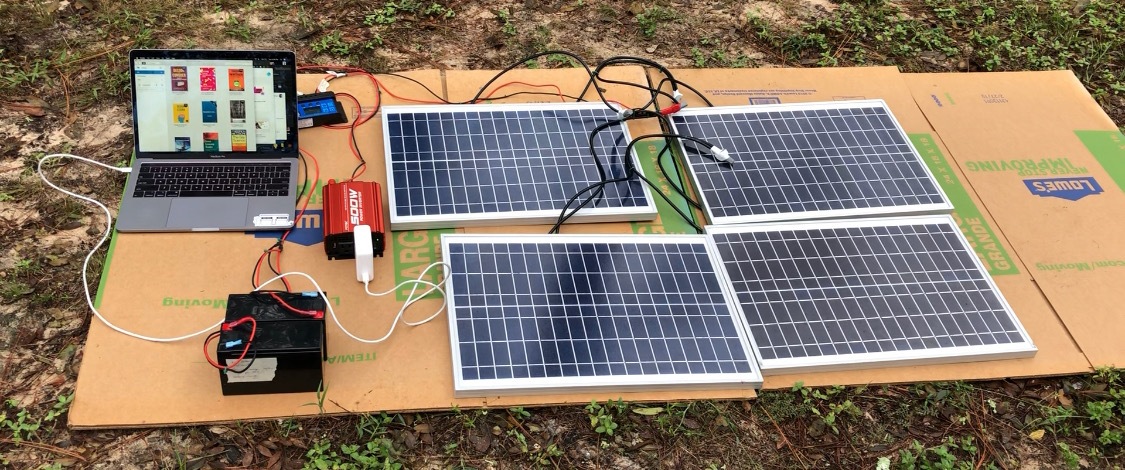By Bianca Trinidad, Class of 2021, BS in marketing and minor in journalism
 Kaitlin Santiago (pictured), a first-year graduate student at GW’s Corcoran School of the Arts & Design, started her first semester of the interaction design master’s program from the comfort of her home in Pensacola, Florida.
Kaitlin Santiago (pictured), a first-year graduate student at GW’s Corcoran School of the Arts & Design, started her first semester of the interaction design master’s program from the comfort of her home in Pensacola, Florida.
“Interaction design is the design point between a human and a system,” explained Kevin Patton, assistant professor of interaction design at the Corcoran. “And sometimes, the systems are filled with humans, which would for instance be service design.”
Interaction design looks at services, such as healthcare delivery, but they also look at app design, and front-end design, such as the visual communication skills around applications and technologies.
Santiago’s online semester did not kick off as smoothly as expected, because her home was hit by Hurricane Sally in mid-September.
“I didn’t know how bad it was going to be,” expressed Santiago. “When I realized there was going to be a hurricane, I emailed my professors and said, ‘Hi, I don’t think I’m going to be in class this week… There’s a hurricane happening now.’”
The following morning, Santiago woke up to no power in her home, including zero cell service. When she was able to get a hold of minimal cell reception and with a little bit of phone battery left, she emailed her professors again explaining her power outage.
“I literally had no idea when I’d be able to get back to class, but all my teachers were helpful saying, ‘It’s okay, we’ll work through this,’” said Santiago.
Suddenly, her professor, Cheyanna Dwyer who teaches the class “Prototyping and Fabrication” pitched an idea that would give Santiago some power source even during the storm’s outage.
“I was all in,” replied Santiago.
The following day, Santiago received an enormous box filled with solar panels, wires and other supplies that were unfamiliar to her. But once she saw the set of instructions, Santiago rushed outside to her yard and built the solar panel system, which allowed her to charge her devices.
“I was so grateful for it because my family was able to charge their devices from it,” expressed Santiago. “Without it, we would have been out of power and unable to contact anyone for two weeks.”
Because of this experience, Santiago’s solar panel project came to life.
Santiago was inspired to use the concept of solar panels as a way to serve the community and is working on prototypes for her current project.
“I started to think about whether I can build a transportable solar panel desk for kids, whose parents may not be able to afford electricity in their homes,” explained Santiago. “So, I’ve been building that as a prototype to see if that is something feasible.”
From creating games that allow elderly people in assisted living homes to do chair yoga to starting a business that stems from discussions on bicultural Americans and food, the Corcoran’s Interaction Design Program is like no other.
The Corcoran offers two degrees in interaction design: a BFA (Bachelor of Fine Arts) and an MA (Masters of Arts), and the program began only two years ago with the first MA class graduating in the spring of 2020.
“With interaction design, we are trying to occupy a space between technology, design, entrepreneurship, innovation and creative practice,” explained Patton. “We are kind of a hybrid between those approaches which leads us to a wide range of thesis and class project ideas.”
Because interaction design is a relatively new field, there is a wide array of ideas about what interaction design is.
“So, we’re really on the spectrum between [the] idea that we want to transform the moment of interaction between a human and a system into something that enables the human to get what they want,” added Patton. “And that’s where [interaction design] sits.”
However, because of the COVID-19 pandemic, the switch to online classes posed initial challenges for many GW programs, including interaction design.
“If [a project] was more technologically oriented, it was an easier transition,” said Patton. “But some of our classes are more service-oriented, and a big part of interaction and service design is community interaction.”
Yet, regardless of the pandemic and inability to engage in person with people in the community, students are still actively finding ways to include service in their interaction design projects at home.
As the semester progresses, other students in the interaction design program continue to work through their projects virtually and on their own. This was first seen as a challenge, because designing heavily involves critiquing and in-person processes, according to Santiago.
“However, I think that the Corcoran and the interaction design program handled the transition very well,” shared Santiago. “Even though we’re virtual, this is a time to come together and solve problems.”
Through interaction design, students are granted the opportunity to grasp unique and marketable hard skills, while getting this framework that wraps around these skills to prepare them to make ethical and human-centered decisions, according to Patton.
“I think that our program is wonderfully positioned to train the next generation of leaders in the concept of managing this intersection between humans and systems,” said Patton.
Because interaction design is so new, there are endless ways for students to reach out and find pathways wherever they decide to go.
“Since we have the freedom, and interaction design is untethered to a specific kind of ancient tradition, we want to use our creative skills to have new thoughts,” expressed Patton. “With interaction design, we want to create new situations for people to thrive.”
ADDITIONAL INFORMATION:
Application deadline for next year's Interaction Design MA program is February 1, 2021.
Click here for more information.


